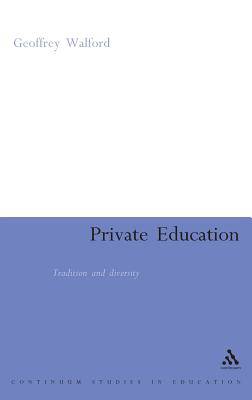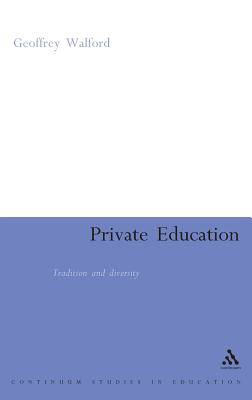
Bedankt voor het vertrouwen het afgelopen jaar! Om jou te bedanken bieden we GRATIS verzending (in België) aan op alles gedurende de hele maand januari.
- Afhalen na 1 uur in een winkel met voorraad
- In januari gratis thuislevering in België
- Ruim aanbod met 7 miljoen producten
Bedankt voor het vertrouwen het afgelopen jaar! Om jou te bedanken bieden we GRATIS verzending (in België) aan op alles gedurende de hele maand januari.
- Afhalen na 1 uur in een winkel met voorraad
- In januari gratis thuislevering in België
- Ruim aanbod met 7 miljoen producten
Zoeken
Omschrijving
Private schools are central to the reproduction of social inequality. For example, whilst in the UK providing only about seven per cent of the school population, about half of the undergraduates at Oxford and Cambridge still come from the private sector.
Private schools have long been associated with privilege and elitism. While this traditional elitist aspect to the private sector is still central, the private school sector is actually far more diverse that is usually acknowledged. It now includes many small schools and faith-based schools that may not offer the traditional advantages of the private sector but which provide a particular environment deemed desirable by parents.
In spite of their educational and social importance, there has been very little academic research and writing on private schools. The proposed book will be the culmination of Professor Walford's research into private schools over the past twenty years.
Private schools have long been associated with privilege and elitism. While this traditional elitist aspect to the private sector is still central, the private school sector is actually far more diverse that is usually acknowledged. It now includes many small schools and faith-based schools that may not offer the traditional advantages of the private sector but which provide a particular environment deemed desirable by parents.
In spite of their educational and social importance, there has been very little academic research and writing on private schools. The proposed book will be the culmination of Professor Walford's research into private schools over the past twenty years.
Specificaties
Betrokkenen
- Auteur(s):
- Uitgeverij:
Inhoud
- Aantal bladzijden:
- 258
- Taal:
- Engels
Eigenschappen
- Productcode (EAN):
- 9780826485991
- Verschijningsdatum:
- 1/12/2005
- Uitvoering:
- Hardcover
- Formaat:
- Genaaid
- Afmetingen:
- 161 mm x 241 mm
- Gewicht:
- 517 g

Alleen bij Standaard Boekhandel
+ 678 punten op je klantenkaart van Standaard Boekhandel
Beoordelingen
We publiceren alleen reviews die voldoen aan de voorwaarden voor reviews. Bekijk onze voorwaarden voor reviews.









